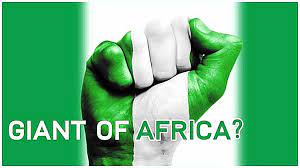Nigeria: The Giant Of Africa

Nigeria, the most populous country on the African continent, is often referred to as the “Giant of Africa” due to its large land area and several factors that contribute to its prominence and influence within Africa and globally.
Nigeria is the most populous country in Africa and the seventh most populous in the world, with an estimated population of over 200 million people. The country’s population is diverse, consisting of numerous ethnic groups, languages, and cultures. This diversity contributes to Nigeria’s rich cultural heritage and the vibrancy of its society. Nigeria, being the most populous and economically dominant country in West Africa, holds significant sway in the region. It is a part of various regional organizations including the Economic Community of West African States (ECOWAS) and contributes significantly towards promoting cooperation and peacekeeping efforts, alongside economic integration among the countries in West Africa.
Nigeria has the largest economy in Africa, mainly due to its abundant natural resources, particularly oil. The country is a major producer and exporter of crude oil, which has historically been a significant source of revenue. Apart from the oil sector, Nigeria’s economy is diversified, with other important sectors such as agriculture, telecommunications, banking, and entertainment contributing significantly to driving economic growth.
The significance of culture in Nigeria extends beyond its borders, especially in music, literature, film, and visual arts. The country has produced legendary musicians such as Fela Kuti, King Sunny Ade, and contemporary artists like Wizkid and Burna Boy. They have popularized music genres like Afrobeat and Afrobeats, gaining international acclaim. Nigerian authors, including Chinua Achebe and Chimamanda Ngozi Adichie, have also made notable contributions to world literature.
Nigeria has become an educational center in Africa, with a vast network of universities, colleges, and educational institutions. Nigerian universities attract students from across the continent and beyond, contributing to the country’s intellectual capital and knowledge exchange.
As a democratic nation, Nigeria has played a vital role in African politics and diplomacy, actively participating in peacekeeping missions, conflict resolution efforts, and regional initiatives promoting democratic governance and stability in Africa.
Despite its “Giant of Africa” status, Nigeria faces numerous challenges, including infrastructure deficits, socio-economic inequalities, corruption, security concerns, and environmental issues. However, the country also possesses vast potential and opportunities for growth, innovation, and development.
Nigeria has earned the title of the “Giant of Africa” due to its large population, strong economy, regional influence, cultural contributions, prominent education, and political significance. Despite facing some challenges, Nigeria continues to play a crucial role in shaping Africa’s future and remains an essential player in global affairs.



